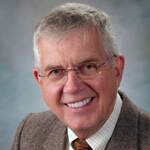
We should plan for being old, so that when the time comes, the stress our children or other caregivers feel can be greatly reduced.
That’s one of the key points made by James Kvale, M.D., a geriatrician at the Health Science Center, in his practical book, “The Real Truth About Aging: A Caregiver’s Guide.” The 2004 release from University of Texas Press is available in the books section of www.amazon.com at keyword James Kvale.
“Plan for being old,” said Dr. Kvale, professor in the department of family and community medicine at the Health Science Center. “Talk with your children about what your wants, wishes and expectations are as you get old, so that your kids know generally what you would like done and have a basis of responding as your needs increase.”
Today’s mobile work world often requires family members to locate too far away to be physically present when decisions must be made. “As a geriatrician here, I deal with that constantly,” Dr. Kvale said. “An elderly patient’s son might be in Seattle and a daughter in New York City, and another son might be overseas. I talk with people over the phone about how they want me to manage their loved ones’ care and comfort.
“This is again a planning issue on the part of the older person. As you age, rather than add to the dispersion, move physically closer to your loved ones to receive the support.”
No matter your age, you should remain intellectually engaged and physically active, and maintain close person relationships with other people in your life. “There is good evidence that people who do this wind up doing better overall,” said Dr. Kvale, who is board certified in family practice, geriatric medicine, and hospice and palliative medicine, and is certified as a medical director.
Dr. Kvale’s 40-plus-year career in medicine began with 17 years in rural Minnesota, where he did the complete spectrum of family practice. After a year of training in geriatrics at the University of Manitoba in Winnipeg, he entered academic medicine in 1980. He has been a faculty member at Southern Illinois University, the Northeast Ohio University College of Medicine, the Emory University School of Medicine, The University of Texas at Austin and the UT Health Science Center at Houston.
He joined the UT Health Science Center at San Antonio in November 2004 after a 10-month fellowship in southern India, where he was a Senior Fulbright Scholar.
“My book has a dual thrust,” he said. “I want to educate the older person, and I want to educate the children of the older person, to tell them what’s normal about getting old.”

